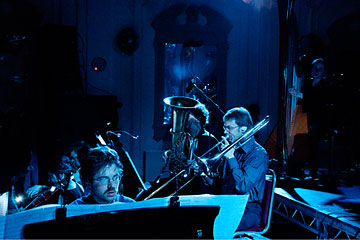
Dance music gets a formal makeover
Brandt Brauer Frick's musical recipe works like this: they combine dark, repetitive piano melodies and minimal string-and-brass arrangements with four-on-the-floor techno beats and live percussion, and glue it all together with a Moog synthesizer. The educated, classically trained Berlin-based trio can perform variations of their set in a symphony concert hall or an after-hours dance club. The result? Restrained, yet danceable music that can confuse crowds but also rock them.
The mostly indie-rock crowd at London's Camden Crawl in May didn't quite get it, but at another gig in Umea, Sweden, "everybody just got up and started dancing, surrounding us onstage, totally freaking out," says Moog player Jan Brauer. When rain hit during their set at London's outdoor Traction Festival in the summer, the crowd simply pulled out umbrellas and kept dancing and cheering.
The band doesn't allow for solos, preferring a collective group consciousness to personal lyricism. "Solos make music feel more like sports, like it's a competition, but with closed communication. That's not us," says drummer Daniel Brandt.
All perfectionists, Brandt Brauer Frick tried to be less didactic with their second and latest album, Mr. Machine, released in October 2011 by !K7 records. They played more instruments, allowed for more flubs and more imprecision, and recorded as a 10-piece group instead of as a trio. "We let the recordings be more natural, but it's a challenge because we're over-ambitious megalomaniacs," says pianist Paul Frick. "But we're really thankful to be making music for a living. This has always been the dream."
Brandt and Brauer, originally from Wiesbaden, Germany, first linked up in Scott, a jazzy techno project. In Berlin they met Frick, a music-composition student who was fusing his own modern classical pieces with house music, and the new band was formed. As a student of film at the Academy of Media Arts in Cologne, Brandt created the group's first video for a class assignment: while playing the song "Bop," the three bandmates appear to be a much larger ensemble.
The music's repetition gives it a cinematic feel. The video for their song "Caffeine" is a black-and-white animation that shows rows of people buying coffee from machines and riding escalators and subway trains in a robotic, orderly fashion. The song never reaches a dramatic hook or chorus but propels itself forward with foreboding sounds and subtle rhythms. The combined result is a tense but addictive audiovisual experience. "We just happen to be ravers with classical-music backgrounds. We didn't plan this," Brandt says.
They're not the first to combine classical with electronic. Switched-On Bach, a 1968 album of classical music performed on synthesizers, won three Grammys and reached Billboard's Top 10. And fellow Germans Kraftwerk experimented with repetition and minimalism using electronic instruments beginning in 1970.
But Brandt Brauer Frick have created a new playbook: they play with a drum kit and an ensemble of trained musicians and singers. They use tuba mouthpieces and violin strings as percussion instruments. U.K. drum and bass and Detroit techno influence their sound as much as composers John Cage and Gustav Mahler. They've also collaborated with musicians as diverse as soul vocalist Jamie Lidell and electronic musician Emika.
"We certainly didn't invent all of these ideas, but it feels fresh to us, like we're making our own inventions," says Frick. Venues don't always approve of their creativity, though; stage managers have told Frick not to tug and pull at the strings inside pianos belonging to the venue. "I tell them, 'Hey, but it's part of the music.' And thankfully the owner of the piano is not always there to stop me."
The trio may have picked the perfect time to pursue their idiosyncratic approach to techno. Electronic dance music, or EDM, is the music genre du jour, embraced by a growing mainstream audience and helping redefine youth culture via arena shows worldwide. There's no telling what a crowd of ravers will make of a group of classically trained Germanic perfectionists. But something seems to be working for Brandt Brauer Frick.
